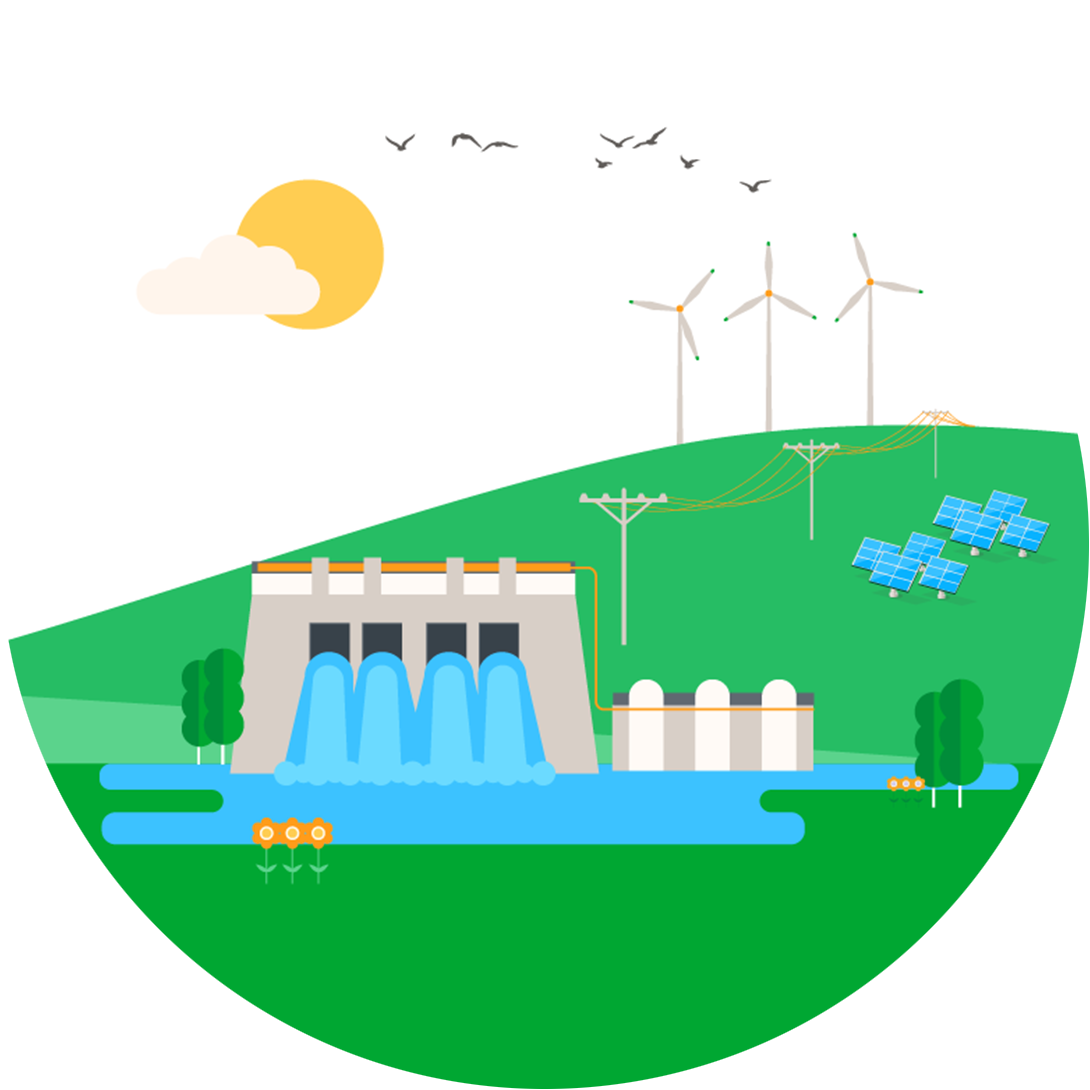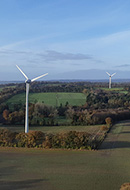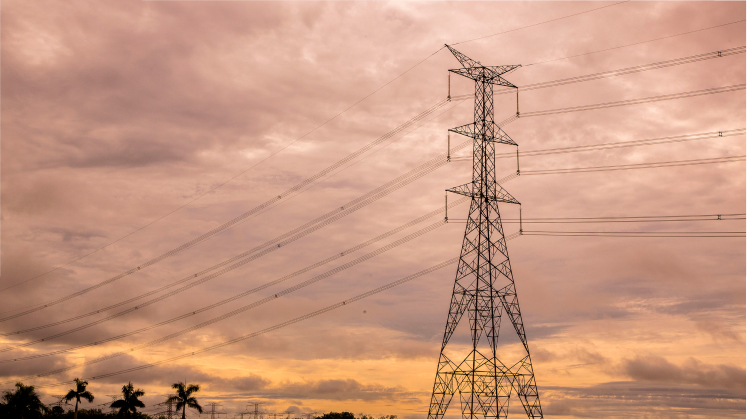Energy transition
Driving a sustainable transition
At Iberdrola, we are committed to spearheading the energy transition, a task we set in motion 20 years ago and which has made Iberdrola Group the world leader in renewables.
The commitment to a decarbonised society is everyone's task. At Iberdrola, we began our energy transition more than 20 years ago and now, having completed it, we can focus on our next challenge: the electrification of the economy. We will achieve this by driving the development of electricity transmission and distribution networks, ensuring that the renewable energy we generate and store reaches more and more people and industries.
However, to understand where we want to go, it is important to know where we came from.
The energy transition is defined as a set of changes in energy production, distribution and consumption patterns to achieve greater sustainability. The aim of this process is to transform the current energy system based on fossil fuels into an electricity model based on renewable energies and other forms of emissions reduction.
The process of energy transition is not new. Other major changes have preceded the current one throughout history, such as the shift from wood to coal as a means of energy production in the 19th century and from coal to oil in the 20th century.
However, the main feature of this transition compared with previous ones does not lie in increasing energy production capacity, but in doing so through methods that are more environmentally friendly. Faced with the evidence of global warming and climate change, and the problem of using finite natural resources such as fossil fuels or oil, action has been necessary. Protecting the Earth by implementing a safe, sustainable and scalable energy network that provides clean electricity and reaches as many people as possible is the best way to care for the planet and its inhabitants. A necessary transformation in which we must all take part and play a leading role.
What benefits will the energy transition bring?
Environmental benefits
-
 Reduction of CO₂
Reduction of CO₂ -
 Reducing the greenhouse effect and global warming
Reducing the greenhouse effect and global warming -
 Use of renewable, inexhaustible and clean energies
Use of renewable, inexhaustible and clean energies -
 Improving air quality
Improving air quality -
 Preservation of biodiversity and natural resources
Preservation of biodiversity and natural resources -
 Development of more renewable energy projects
Development of more renewable energy projects


Social benefits
-
 Improving people's health and well-being
Improving people's health and well-being -
 Increased environmental awareness
Increased environmental awareness -
 Boosting energy efficiency
Boosting energy efficiency -
 Conflict mitigation for scarce resources
Conflict mitigation for scarce resources -
 Energy democratisation and social equity
Energy democratisation and social equity -
 Proliferation of green jobs
Proliferation of green jobs
Climate change: a major challenge for humanity
Climate change is today's greatest environmental challenge. For years we have been experiencing unprecedented rapid global warming as a consequence of human activity, mainly due to the burning of fossil fuels that generate greenhouse gas emissions. In this sense, the electricity sector plays a key role in achieving the goal set by the historic Paris Agreement to limit the increase in global temperature to 1.5ºC and to halt the decarbonisation of the economy through the energy transition.
The effects of climate change
The impacts of climate change are already perceptible, according to data from the World Meteorological Organisation (WMO):
From energy transition to electrification
Only by addressing the major challenges can we achieve a resilient and planet-friendly change of model. That is why we committed ourselves to spearheading the energy transition, a task we set in motion 20 years ago and which has made Iberdrola Group the world leader in renewables.
At Iberdrola, we are committed to investing €58 billion up to 2028 to drive electrification, autonomy, supply security, employment and net-zero emissions. For us, networks are the backbone of our activity, as they contribute to integrating renewable generation, enable the implementation of new solutions and deliver electricity to end users. This is why we plan to invest €37 billion in networks in the United Kingdom, the United States, Brazil and Spain, representing 65% of the planned investment.
We are aware of our role as a driving force and benchmark for many other companies in their goal of electrifying the economy and investing in clean energy.

Energy Transition as a Service (ETaaS)
This is how we can help you on your path to electrification.

Hard-to-abate sectors
These are the challenges facing sectors that are difficult to decarbonise.
Energy transition in Europe
The European Union (EU) was one of the first players to set a course towards the energy transition, when in 2007 it presented the first climate and energy targets for 2030 based on three main pillars: the reduction of greenhouse gas emissions, the deployment of renewable energies and the improvement of energy efficiency.
The final step came at the end of 2019 with the presentation of the European Green Deal. Supported by major companies such as Iberdrola, this agreement establishes a strategic roadmap that places the just-and-green energy transition at the centre of political action. The commitments are based on achieving a climate-neutral EU by 2050, protecting biodiversity and developing clean energy, among others.
Current European energy targets for 2030 include:
Countries with pioneering energy policies
Sustainability is increasingly high on the political agenda in many countries. However, only a few of them can be considered true pioneers in adopting legal frameworks for energy transition. This is the case of Denmark, which stands out for its plan to reduce greenhouse gas emissions by 70% by 2030 – one of the most ambitious programmes in Europe. By 2050, the country expects to be carbon neutral.
Neighbouring countries Sweden and Finland also stand out as historical forerunners of climate policies that are committed to the deployment of renewable energies and the total abandonment of fossil fuels. Various reports point to progress in green policies in other countries beyond the European Union, such as the United Kingdom, Iceland, Canada and New Zealand. However, the United Nations warns that there is still a long way to go.
Just energy transition: an inclusive approach
The need to accelerate climate action and optimise its benefits gives vital importance to the concept of just transition: it implies the implementation of the policies and the frameworks of social dialogue necessary to progress in ecological transition and leave no one behind, generating prosperity for the whole of society from an inclusive approach, suitably protecting workers and creating quality jobs. This framework for action must identify opportunities and work collectively to take advantage of them, linking such diverse actors as workers, national and regional governments, companies, investors, NGOs, etc.
The transition will be full of new opportunities: promotion of renewable energies, new mobility services, more sustainable and resilient, agri-food models industries with higher added value, etc. However, it will also mean the disappearance or progressive shrinkage of some sectors – coal mining for instance. The impacts will therefore be uneven, and particularly affect certain regions, areas and groups. Despite this, the International Labour Organisation (ILO) is optimistic in its report World Employment and Social Outlook
 , which indicates that changes in the use and production of energy to reach the target of 2°C might generate around 18 million jobs around the world.
, which indicates that changes in the use and production of energy to reach the target of 2°C might generate around 18 million jobs around the world.







